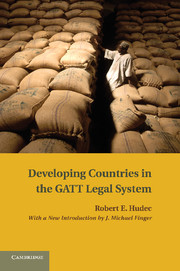Book contents
- Frontmatter
- Contents
- Foreword by Hugh Corbet
- Acknowledgments
- DEVELOPING COUNTRIES IN THE GATT LEGAL SYSTEM
- Introduction to the New Edition
- PART I A HISTORY OF THE LEGAL RELATIONSHIP
- 1 Post-war Negotiations on Trade Liberalization
- 2 First Decade of the GATT – 1948–1957
- 3 Demands for a New Legal Relationship – 1958–1963
- 4 Defining the New Relationship – 1964–1971
- 5 Testing the New Relationship – 1972–1979
- 6 Developments in the 1980s – Form without Substance
- PART II A LEGAL CRITIQUE OF THE GATT'S CURRENT POLICY
- List of References
- Index
- References
1 - Post-war Negotiations on Trade Liberalization
Published online by Cambridge University Press: 03 May 2011
- Frontmatter
- Contents
- Foreword by Hugh Corbet
- Acknowledgments
- DEVELOPING COUNTRIES IN THE GATT LEGAL SYSTEM
- Introduction to the New Edition
- PART I A HISTORY OF THE LEGAL RELATIONSHIP
- 1 Post-war Negotiations on Trade Liberalization
- 2 First Decade of the GATT – 1948–1957
- 3 Demands for a New Legal Relationship – 1958–1963
- 4 Defining the New Relationship – 1964–1971
- 5 Testing the New Relationship – 1972–1979
- 6 Developments in the 1980s – Form without Substance
- PART II A LEGAL CRITIQUE OF THE GATT'S CURRENT POLICY
- List of References
- Index
- References
Summary
GATT LEGAL policy towards developing countries owes nothing to the past. There was no Golden Age that pointed the way. Before 1939, the organizing principle for rich-poor relationships had been colonialism. Most of the countries in Africa and Asia were colonies de jure. A goodly portion of those in Central and South America were colonies de facto. This colonial past was not what the post-1945 world was looking for. The world required a clean start – a completely new departure.
Policy in the United States before 1939 stood apart from the explicitly colonial policies of the other major powers. The United States had few de jure colonies. Although its economic and political relationship with most Latin American countries was de facto colonial, its formal legal relationship with those countries consisted of conventional sovereign-to-sovereign dealings, with very few of the preferential qualities found in the typical colonial relationship. In the years 1934–42, the United States negotiated reciprocal trade agreements with twenty-seven countries, including the following sixteen developing countries: Cuba, Haiti, Brazil, Honduras, Colombia, Guatemala, Nicaragua, El Salvador, Costa Rica, Ecuador, Turkey, Venezuela, Argentina, Peru, Uruguay and Mexico. Each agreement contained a reciprocal exchange of tariff reductions and a framework of other GATT-like obligations to protect the commercial value of the tariff reductions. None of these agreements called for special treatment because of developing-country status.
- Type
- Chapter
- Information
- Developing Countries in the GATT Legal System , pp. 26 - 38Publisher: Cambridge University PressPrint publication year: 2010



